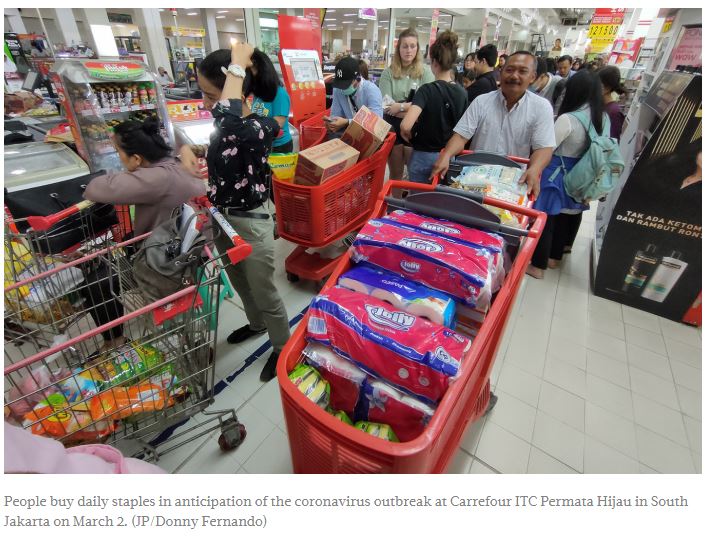Indonesia: Panic buying hurts consumption growth in the long run, analysts say
Experts have warned that the waves of panic buying seen in many supermarkets in Jakarta in recent weeks may contribute to an increase in inflation and hurt the country’s consumption growth in the long run.
“The danger of panic buying is that it can create inflation, especially for staple foods,” a senior economist at the Institute for Development of Economics and Finance (INDEF), Aviliani, told The Jakarta Post over the phone on Wednesday.
The first wave of panic buyers hit supermarkets at the start of the month, on March 2, after President Joko “Jokowi” Widodo announced the first two cases COVID-19 in Indonesia.
Another wave of buyers purchasing in bulk was seen over the weekend as the number of cases in Indonesia grew rapidly. As of Thursday, there were 227 confirmed cases and 19 deaths.
The prices of several staple goods have seen a drastic increase. According to the National Strategic Food Prices Information Center (PIHPSN), the average price for a kilogram of granulated sugar across all provinces in Indonesia reached Rp 17,050 (US$1.06) on Thursday, significantly higher than the highest retail price (HET), which is pegged at Rp 12,500 per kilogram.
Aviliani urged the central government to work with regional governments to stabilize staple goods because if their prices became volatile, it would not only cause inflation but also “the growth of the economy will slow down”.
The Indonesian economy depends, in large part, on household consumption. Household consumption accounted for 56.62 percent of the country’s total gross domestic product (GDP) in 2019, according to the fourth-quarter report on Indonesia’s economic growth by Statistics Indonesia (BPS).
The Asian Development Bank (ADB) cited Indonesia’s “strong domestic consumption” as the backbone of the country’s economic growth in 2020, according to the Asian Development Outlook 2019 Update report.
“Robust consumption should see Indonesia’s economic expansion continue at a healthy pace this year [2019] and next year [2020],” said ADB country director for Indonesia Winfried Wicklein as quoted in an ADB press release on Sept. 25, 2019.
The paradox of panic buying is that it may seem to spur consumption, but, in the long run, it actually does not because people will buy less in the future. “Simply, the more you buy now, the less you will buy later,” an analyst at a major brokerage house told the Post on Thursday.
The analyst said that “the impact on economic growth will be marginal if we stretch the time frame over the longer horizon” because consumers would need more basic necessities than their usual spending patterns.
He cautioned about the impact of the novel coronavirus on purchasing power.
“If more jobs are lost than created, it will lead to reduced purchasing power and hamper demand,” the analyst explained.
Transmart Carrefour vice president of corporate communications Satria Hamid told the Post on Wednesday that the supermarket chain had seen sales increase by 50 percent year-on-year within the last two weeks.
“[…] mostly staple foods, followed by hand sanitizer, masks, gloves, hand soap and also goods such as fruits and health supplements,” Satria said, adding that in addition to the stockpiling that occurred on March 2, a significant increase in purchases had been seen over the weekend and had carried into Tuesday of this week.
Satria mentioned that Transmart Carrefour was coordinating with the Trade Ministry and the Jakarta administration to ensure a steady supply of goods. Its coordination with the ministry sought to increase access to staple items, including sugar, whose prices have soared.
The Indonesian Retailers Association (Aprindo) released a statement on March 2 urging “the Indonesian public not to carry out panic buying due to phobias”.
“Panic buying happens when there is a perception formed in society without clear information,” Aviliani told the Post, explaining that the images of empty shelves circling on social media had caused fear in consumers that they would not be able to buy necessary goods when they needed to. (ydp)
Source: https://www.thejakartapost.com/news/2020/03/20/panic-buying-hurts-consumption-growth-in-the-long-run-analysts-say.html


 English
English




